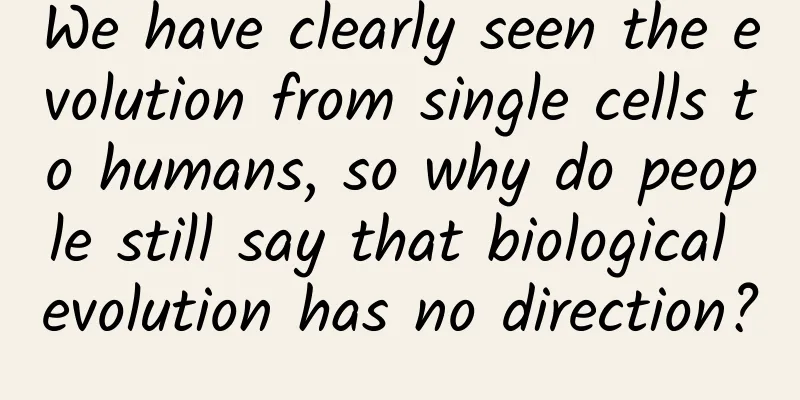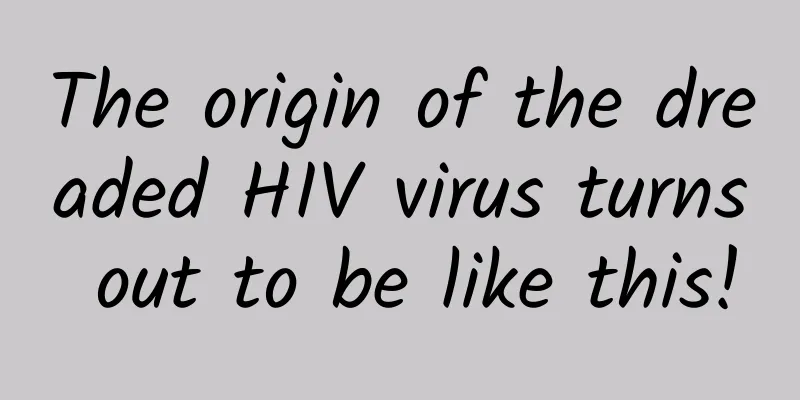We have clearly seen the evolution from single cells to humans, so why do people still say that biological evolution has no direction?

|
The day before yesterday, we happened to talk about biological evolution, and mentioned a basic principle, that is, the environment is only responsible for screening, not shaping. However, a friend pointed out that we can clearly see that organisms are becoming more and more complex, and the direction from single-celled organisms to humans is obvious. How can we say that it is not directional? In fact, everyone has overlooked an important point, that is, organisms themselves are also part of the environment. Nature only leaves behind those individuals or species that gain advantages in competition and cooperation with other organisms. How should this be understood? Let's take a look at the war over nectar. Researchers at Stanford University in the United States have discovered that the switch for flowers to release nectar - a class of transport proteins and genes called "SWEET" control the amount of sugar released from cells. They not only hold power in the nectaries of flowers, but also control the speed of transporting sugar energy substances from energy reservoirs (cotyledons or endosperms) when seeds germinate, and the efficiency of providing sugar energy to moving sperm when pollen germinates on the stigma of the pistil. Even our human blood sugar levels are closely related to these genes, because they control the rate at which sugar in the liver is released into the blood. It is right to call them "sweet" genes. Theoretically, if we master this gene, we can master the production of nectar. In fact, there are already "eaters" who have taken the lead, that is, bacteria and fungi that parasitize between plant cells. How these guys get energy in plants has always been a puzzle that puzzled scientists. After all, plants are not philanthropists and do not treat these uninvited guests well. However, in the above study, scientists were surprised to find that these diners touched the keyhole of the landlord's kitchen and successfully opened the door - the signal factors they secreted can directly act on the promoter of the "SWEET" gene, causing plant cells to secrete a large amount of sugar for them to enjoy. This is also a smart choice to obtain energy without destroying the host cells. While other organisms are busy dealing with nectar, plants are also doing something in the nectar. Scientists have long noticed a phenomenon that bees are particularly loyal to one type of flower when collecting nectar, and they are not like what we imagine, especially when citrus trees are in bloom, when they completely ignore other flowers nearby. Why is this? Because citrus nectar contains caffeine, which is the substance that makes bees loyal and dedicated. Just as caffeine stimulates the human brain, this chemical can also stimulate an area of the bee's brain that is related to learning and remembering smells. The intake of caffeine makes the bees remember deeply the matter of collecting nectar from citrus flowers. So, for a long time to come, the bees can't do without this special nectar. In addition, the bitter nectar containing caffeine has some special effects, which is to force bees to leave after collecting a certain amount. As we mentioned earlier, bitter substances are toxic after all. Bees cannot collect too much toxins in a concentrated manner, and the bitter taste is unbearable. The bees that leave in a hurry will take the pollen to a farther place, thus avoiding inbreeding between the flowers of a plant. This practice can help plants produce better quality seeds. In this way, bitter nectar kills two birds with one stone. Caffeine helps citrus employers get loyal and good employees. In these battles, there is no real winner. In fact, everyone is desperately trying to gain energy while reducing expenditure. This is the tone of life evolution. In life evolution, there are rarely life-or-death choices, but more about efficiency differences. In fact, a simple calculation will show that even if the reproductive success rate is 10% higher than that of other species, after just a few dozen generations, this highly efficient species will have a clear advantage. In the competition, producers, consumers, and predators with good equipment and high feeding efficiency gradually replaced simple species, and then we saw the so-called direction of evolution. However, this is only a by-product of the arms race and efficiency competition between organisms. |
>>: How can afforestation change China?
Recommend
[Li Jiaoshou] How to conduct consumer research without a large budget?
Consumer Survey Regarding consumer surveys, one o...
Why non-Apple developers should care about Swift
[51CTO.com Quick Translation] With the ability to...
2020 Aion S launched: King of Evolution with more features but no price increase
On July 2, the annual upgraded model of GAC New E...
Shen Yi: The Protagonists in the White House
Lecturer Shen Yi Introduction Professor of Intern...
Is Bilibili’s brand account “rising”?
When it comes to brand names, you automatically a...
If you always get acne on your scalp, chest and back, take this guide to fighting acne!
As the weather warms up, it's time to wear sh...
With Mango TV as the fulcrum, ZIVOO creates a full-experience living room entertainment
Mango TV seems to be a "lone ranger", l...
The legendary car is no longer popular, SAIC-GM-Wuling is facing a cold winter
In the past, SAIC-GM-Wuling relied on its price a...
Brother Cat Oriental Jade Cat decisive battle strong stock weapon to firmly grasp the main rising wave of strong stocks video + document + indicator 8 episodes
Brother Cat Oriental Jade Cat decisive battle str...
Can AI change the way science is done?
Artificial intelligence (AI) is shaping the scien...
Earthquake Savior: The History of Seismographs
Written by Snow A seismograph is an instrument th...
How many of the internet celebrity brands that have been all over the screen are still alive?
Although today, many emerging consumer brands hav...
Systematic and universal PS post-production method revealed
Systematic and universal PS post-production metho...
Are ticket-grabbing mini-apps really useful? What ticket-grabbing mini-apps are there on WeChat?
It’s the Spring Festival travel season again, and...
GuangDianTong optimization skills, GuangDianTong delivery algorithm, how to promote GuangDianTong?
Guangdiantong delivery algorithm: Impression allo...









